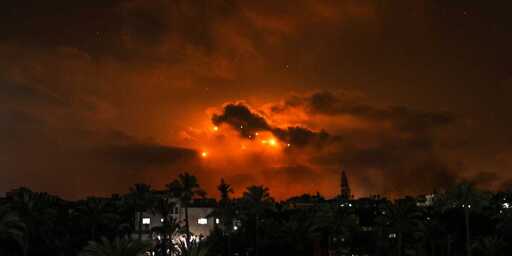 Illumination flares light up the night sky over Deir al-Balah, Gaza, July 21, 2025, during an Israeli ground assault. The Israeli military launched flares over the city as it expanded its operations into central Gaza for the first time since the war began. (Photo by Ali Jadallah/Anadolu via Getty Images)
Illumination flares light up the night sky over Deir al-Balah, Gaza, July 21, 2025, during an Israeli ground assault. The Israeli military launched flares over the city as it expanded its operations into central Gaza for the first time since the war began. (Photo by Ali Jadallah/Anadolu via Getty Images)
DEIR AL-BALAH, GAZA—At 7 a.m. on Sunday, Mohammed Mahmoud Abu Heswan, a 26-year-old school teacher in Deir al-Balah received a message on his phone from the Israeli military. The communication included a map with expulsion orders for a part of the city covering several neighborhoods to the south.
“It was the hardest hour of my life,” Abu Heswan told Drop Site. “Just yesterday I was preparing to teach children. And now I had to decide what to carry, where to go, and wondering whether my family would survive.”
With a large family—a father, uncles, five brothers, two sisters, and all their children—he scrambled to think of what to do. “We asked ourselves: ‘Do we take the furniture or just blankets? Can we even carry anything at all? Where will we go?’”
The family decided to split up. Abu Heswan took most of the women and children to find shelter, while his father and brothers stayed behind to try and secure the house before departing. At around 4:15 p.m., the area was hit with heavy bombardment.
“I was meters away when I heard the explosion,” Abu Heswan said. “I knew it was our neighborhood. People were screaming, injured voices were calling for help. I panicked—my father, my brothers—they were still there.”
He rushed back to find his father injured, but alive. His uncle, 54-year-old Mohammad Shaaban Abu Heswan, had been killed by shrapnel. Beside him lay Abu Heswan’s 11-year-old cousin, Sama, bleeding profusely from her leg, which had been severed. They carried her to the hospital where doctors managed to save her life.
The family eventually fled from the south of Deir al-Balah, where the Israeli ground attack was concentrated, to the north of the city, where they now live crammed in a tent. “We didn’t take anything but the clothes on our backs,” he said.
Israel’s military campaign in Deir al-Balah on Sunday marked the first time since the beginning of the war 21 months ago that Israeli troops launched a major offensive on the city, located in central Gaza. Unlike every other major city or town in Gaza—including Gaza City, Khan Younis, Jabaliya, Rafah, Beit Lahia, and elsewhere—Deir al-Balah is the only city in Gaza that had not yet been subject to a major Israeli ground operation or suffered widespread devastation.
The displacement orders issued by the Israeli military on Sunday cover about 5.6 square kilometres (2.1 miles) of Deir al-Balah, spanning four neighborhoods that house between 50,000 and 80,000 people, including some 30,000 people sheltering in dozens of displacement sites, according to UN estimates. The expulsion area cuts through the city all the way to the Mediterranean coast, effectively cutting access between Deir al-Balah and cities to the south of Khan Younis and Rafah.
 Israeli military displacement order for parts of Deir al-Balah. July 20, 2025. Source: X
Israeli military displacement order for parts of Deir al-Balah. July 20, 2025. Source: X
In addition to tens of thousands of displaced Palestinians, Deir al-Balah is also where the headquarters of several UN agencies and international NGOs are based.
On Monday, the World Health Organization (WHO) said Israeli forces raided its main staff residence in Deir al-Balah, forcing women and children to forcibly displace on foot toward the coast. ”Male staff and family members were handcuffed, stripped, interrogated on the spot, and screened at gunpoint,” the group said in a statement. “The latest evacuation order in Deir al-Balah has affected several WHO premises, compromising our ability to operate in Gaza and pushing the health system further towards collapse. WHO’s main warehouse located in Deir al-Balah is within the evacuation zone, and was damaged yesterday when an attack caused explosions and a fire inside.”
The United Nations moved most of its operations to Deir al-Balah after Israel invaded Rafah in May 2024, and the UN said it would remain in Deir al-Balah in defiance of Israel’s expulsion orders. “We are currently staying,” Stéphane Dujarric, spokesperson for the UN Secretary-General, said during a press conference on Monday. “Deir al-Balah is our humanitarian hub. From there, staff is dispatched to different parts of Gaza. That’s where our equipment is. That’s currently where our headquarters are.”
The affected displacement area is also home to critical water infrastructure, including the Southern Gaza Desalination Plant, three water wells, a water reservoir, as well as a wastewater pumping station. “Any damage to this infrastructure will have life-threatening consequences,” the UN Office for the Coordination of Humanitarian Affairs said in a statement.
The latest directive means that nearly 88% of Gaza is now under displacement orders or within an Israeli “militarized zone,” meaning that over two million people are supposed to squeeze into a fragmented 12% of the enclave.
“It seemed the nightmare couldn’t possibly get worse. And yet it does,” said Volker Turk, the UN United Nations High Commissioner for Human Rights.
The assault on Deir al-Balah came as Israel’s campaign of forced starvation on Gaza is reaching a tipping point. 33 Palestinians have died of malnutrition and starvation over the past two days alone, according to the Gaza health ministry. There are reports of people arriving at emergency rooms in a state of extreme exhaustion and fatigue or collapsing in the streets.
Palestinians who try to get food from so-called “distribution hubs” run by the U.S.- and Israeli-backed Gaza Humanitarian Foundation or from the few UN trucks carrying flour allowed into Gaza are shot, shelled, and attacked by Israeli troops on a daily basis. Over 1,000 have been killed in aid massacres in less than two months.
“Stop the bloodshed. End the famine. People are fainting in the streets from hunger,” Ahmed Rayhan, a 25-year-old resident of Deir al-Balah, told Drop Site. “We need an immediate truce. We need open crossings for food, medicine, and to evacuate the wounded.”
Rayhan was forcibly displaced from his home in Deir al-Balah on Sunday along with his eight family members after Israel issued the expulsion orders. He found out when his neighbor received a call from the Israeli military with a recorded message. He said the attack on the city came in the afternoon. His 47-year-old relative, Khaled al-Fleet, was severely wounded when shrapnel lodged in his skull. “We didn’t sleep a single minute. The jets struck every five minutes. The helicopters were firing nonstop. The artillery never paused. And the quadcopters—those were the most terrifying—they entered homes, hovered, and fired.” He and his family eventually managed to move to a shelter in the center of the city.
Drop Site News is reader-supported. Cconsider becoming a free or paid subscriber.
More Statements from Western States Amid Genocide
Amid the continued Israeli military assault and starvation campaign, 28 countries, including major European powers like Britain and France, issued a joint statement on Monday saying “the war in Gaza must end now.”
“The suffering of civilians in Gaza has reached new depths. The Israeli government’s aid delivery model is dangerous, fuels instability, and deprives Gazans of human dignity. We condemn the drip feeding of aid and the inhumane killing of civilians, including children, seeking to meet their most basic needs of water and food,” the statement said. “We call on the Israeli government to immediately lift restrictions on the flow of aid and to urgently enable the UN and humanitarian NGOs to do their life saving work safely and effectively.”
Israel and the U.S. rejected the statement. In a post on X, U.S ambassador to Israel Mike Huckabee said: “Disgusting! 25 nations put pressure on Israel instead of savages of Hamas! Gaza suffers for 1 reason: Hamas rejects EVERY proposal. Blaming Israel is irrational.”
While the statement by European and other nations was strongly worded, it offered no changes in policy.
“This was a deliberate statement [by Western nations] to divert attention from their refusal to take any meaningful action to achieve the objectives they lay out,” Mouin Rabbani, co-editor of Jadaliyya and a former UN official who worked as a special adviser on Israel-Palestine for the International Crisis Group, told Drop Site. “They have all the leverage they need, all the means they need, to more or less instantaneously bring about the objectives that they claim they are seeking to achieve, but they have made a deliberate policy choice not to do so, and their primary contribution in this genocide is to send weapons to Israel, to ensure that there are no meaningful consequences for Israel.”
“The Trump administration at least had the decency and the honesty not to pretend to care,” Rabbani added. “But these European and other western governments put out a statement that they know is meaningless, that is basically designed as a sop to public opinion to give the impression of actually caring, of actually doing something while using that as a cover to continue with business as usual.”
From Drop Site News via this RSS feed


